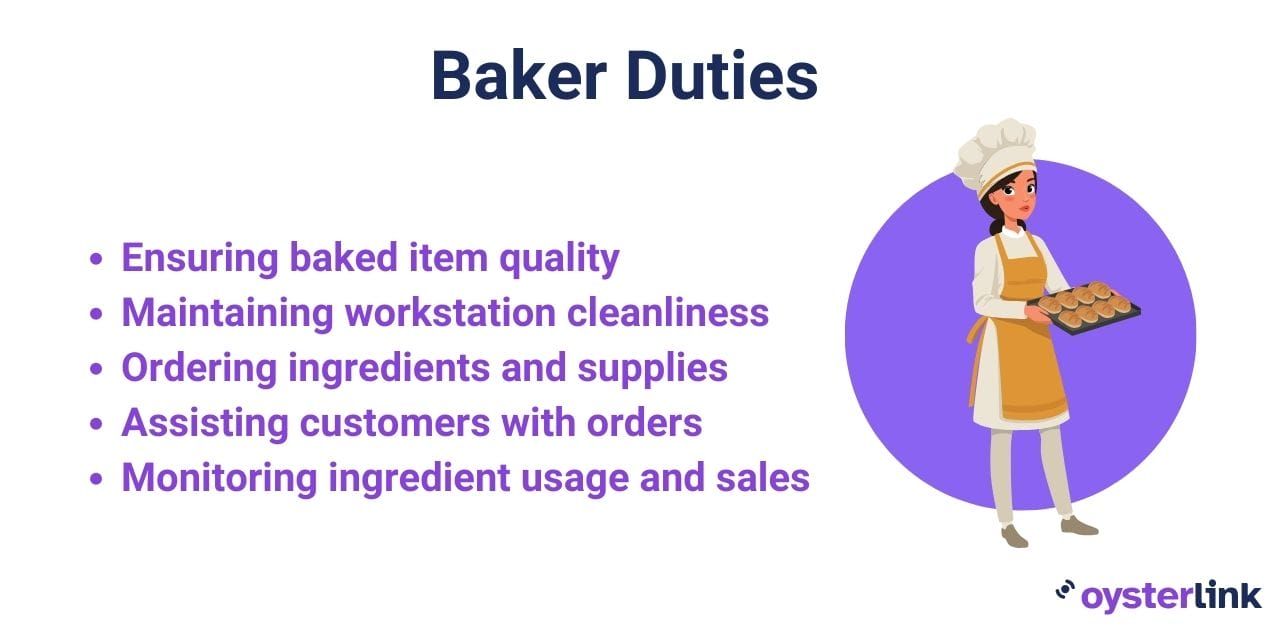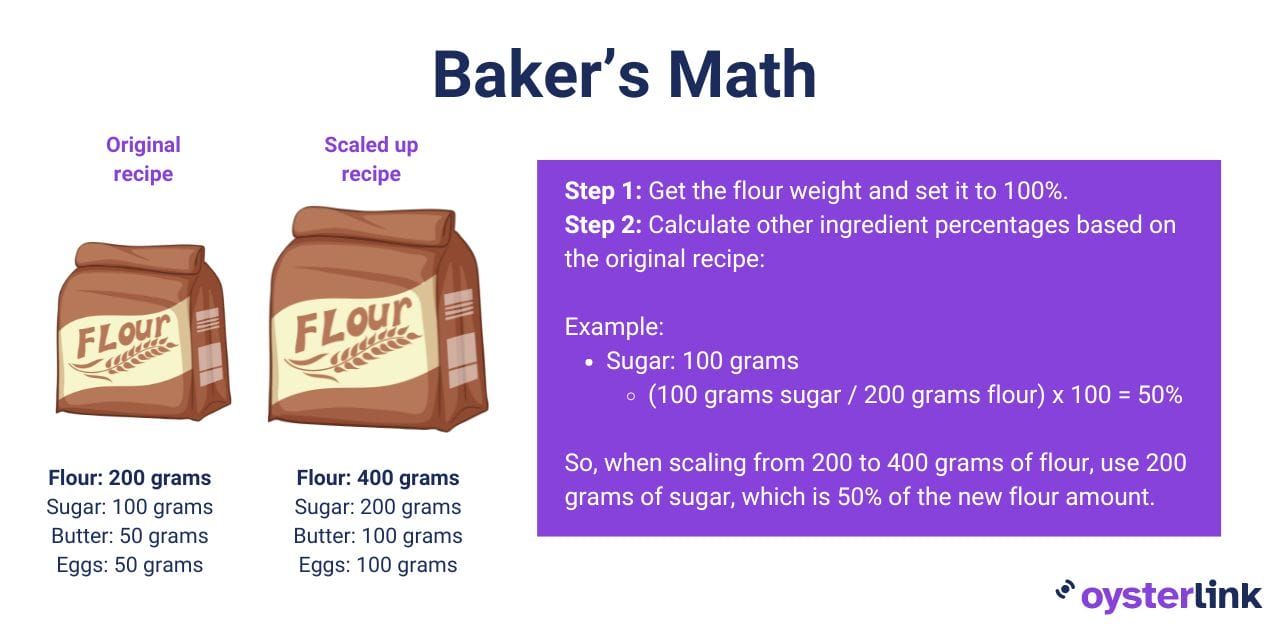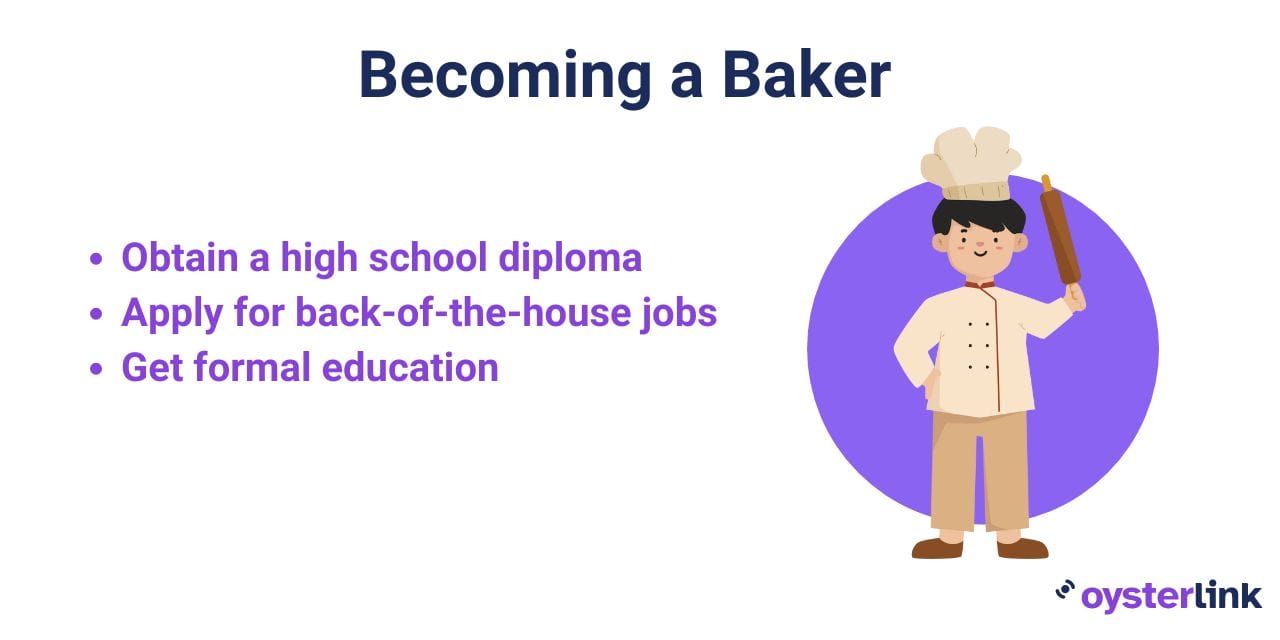Guide to a Baker Career
If you’re thinking of becoming a Baker, you’ve definitely landed in the right place. Before we begin, it’s important to understand that there’s no one way to start a career as a Baker.
Some people begin by applying for back-of-the-house jobs, such as being a Dishwasher, and work their way up, while others start by enrolling in culinary school. Whatever initial path you choose, the key is to gain practical experience and knowledge.
In this guide, we’ll provide insights into the duties and responsibilities of a Baker, the top skills needed and career advancement opportunities to help you succeed in this role.
What Does a Baker Do?
Job duties of a Baker include:
- Following recipes to create baked goods such as fresh bread, pastries and pies
- Ensuring the quality of the establishment's baked goods
- Maintaining the cleanliness of the workstation, baking equipment and tools
- Ordering ingredients and other essential kitchen supplies
- Assisting customers with their orders
- Monitoring ingredient usage and tracking sales to optimize costs and minimize waste

Where Do Bakers Work?
When looking for a job as a Baker, you’ll see that they’re employed in various establishments, including bakeries, restaurants, pastry shops and hotels. Sometimes, they also run their own businesses. Their work environment depends largely on the type of establishment they’re employed by and the specific job duties.
Establishments range from small neighborhood bakeries to large commercial establishments. There, Bakers typically work early mornings or late nights to deliver fresh baked goods for customers. They may also work weekends and holidays, depending on when the bakery operates.
In other types of establishments, such as restaurants and hotels, they work with the rest of the kitchen staff to create various types of baked goods from the menu.
Regardless of where they’re employed, the environment Bakers work in can be noisy and busy, especially during peak hours.
Bakers have to remain focused as they operate hot ovens and stovetops. Additionally, they have to follow food safety practices to ensure the baked goods they create are safe for customers to consume.
Physical demands of the job include carrying bags of flour, bulk-sized bags of ingredients and other supplies they work with.
Top 3 Skills Every Baker Should Have
We compiled a list of skills you need to develop to ensure a successful career as a Baker.
1. Attention to detail
From understanding the recipe and measuring ingredients to decorating baked goods, Bakers need keen attention to detail to ensure that the final product meets the establishment’s quality standards.
2. Math skills
Creating baked goods and delicious pastries requires basic math skills. The perfect example of this is a concept called “baker’s math”.
Baker's math refers to the method used whenever you're following a recipe that uses flour as the main ingredient. It shows how much of each ingredient you need compared to the amount of flour you'll be using.
For example, let's say that you need to make cookies and the recipe shows you need the following ingredients with their corresponding weights:
- Flour: 200 grams
- Sugar: 100 grams
- Butter: 50 grams
- Eggs: 50 grams
However, you need to make a bigger batch. You'll need to use 400 grams of flour instead of 200 grams. How do you figure out how much of the other ingredients in grams you'll need?
The first step is to set the flour weight to 100%. Second, find the percentage of the other ingredients using the formula below:
- Flour: 200 grams = 100%
- Sugar: 100 grams
- (100 grams / 200 grams flour) x 100 = 50%
- Butter: 50 grams
- (50 grams / 200 grams flour) x 100 = 25%
- Eggs: 50 grams
- (50 grams / 200 grams flour) x 100 = 25%
So, when you scale up to 400 grams of flour, you'll be using the following new amounts:
- Sugar: 50% of 400 grams flour = 200 grams sugar
- Butter: 25% of 400 grams flour = 100 grams butter
- Eggs: 25% of 400 grams flour = 100 grams eggs

3. Knowledge of baking equipment
Familiarity with different baking equipment helps you create better baked goods and saves you time, energy and resources.
For example, using a paddle instead of a whisk as a mixer attachment when you're trying to make whipping cream will result in a thicker, smoother texture instead of the light, airy consistency that a whisk provides. Understanding baking equipment and its functions enhances your productivity and minimizes the waste of ingredients.
How To Become a Baker
Consider following these steps to help you prepare for a career as a Baker.
Obtain a high school diploma
Many employers want Bakers to have a high school diploma.
Having a high school diploma indicates that you have all the basic skills needed to fulfill the role. This includes reading skills to follow instructions from a baking book, math skills to convert recipe measurements and communication skills to interact with your teammates and customers.
In addition, should you decide to enroll in a culinary school later on to further your knowledge, you will be asked to submit a copy of your high school diploma.
Apply for back-of-the-house jobs
Working as a Dishwasher is one of the easiest ways to get your foot in the door in the baking industry. For one, all establishments need Dishwashers. Two, this role is entry-level and doesn’t require a lot of qualifications to get accepted. Once you’re offered the job, do your best to get noticed by your supervisor by being punctual, organized and calm, especially during peak hours.
It might take a few months, but it’ll all be worth it when you get to learn baking on the side by observing how experienced Bakers work, asking them questions and expressing your interest in being mentored for the role.
Get formal education
While a degree in culinary arts isn’t mandatory, getting a formal education from a renowned baking school provides many benefits.
First, it can make up for the lack of professional experience that some establishments require. For example, an employer we included in our list of Baker jobs in Miami specified that a culinary degree is accepted in lieu of three years of professional experience.
Second, completing a course in a bakery school boosts your credibility. This is especially valuable if you plan on opening your own bakery someday and you require investors. Investors tend to look for business owners with strong credentials that show commitment toward mastering their craft.
Third, you’ll learn important baking techniques, skills and knowledge.
At Auguste Escoffier School, they offer a Fundamentals of Baking and Pastry course which teaches the following:
- Different types of dough
- How to accurately measure and control temperature
- How to mix, shape and proof different types of bread
- Hydration in bread doughs, gluten formation and the differences between cold proofing and warm proofing
After you gain more experience, you can consider becoming a certified Baker by completing a program at the Retail Bakers of America. Certifications such as Certified Journey Baker (CJB), Certified Baker (CB) and Certified Master Baker (CMB) can help you progress your career and land better jobs in the role.
You can also obtain certifications offered by The Bread Bakers Guild of America (BBGA) and American Society of Baking (ASB).
Be persistent
Don’t be discouraged if you don’t land the first Baker job you apply for. Keep looking for establishments that hire Bakers, study their Baker job descriptions and see how your skills and experience align with what they’re looking for.
When applying for jobs, create a good resume and write a cover letter that highlights why you’d like to work as a Baker and what skills you bring.
Once you land an interview, prepare by reading common Baker interview questions and think of answers that may help you get hired. Additionally, dress appropriately for the interview and make sure to bring a copy of your resume.

Baker Salary
Bakers in the U.S. earn an average of $35,550 per year. Additionally, Bakers in New York City tend to earn more, with $40,351 per year because of the city's high cost of living and booming tourism industry.
What Are the Pros and Cons of Being a Baker?
Pros:
- Plenty of room for creativity: This job involves experimenting with ingredients to develop new recipes, decorating cakes and deciding on themes for the establishment's baked goods.
- Good career advancement opportunities: Bakers can be promoted to Head Baker or work their way up to the role of Pastry Chef.
- Earning potential: If you choose to specialize in research and development to help large food corporations improve their recipes, you can pursue a career as an R&D Baker and earn $94,742 a year.
Cons:
- Long working hours: Many Bakers are expected to work weekends, holidays and nights.
- Physically demanding: Bakers are mostly on their feet, lifting heavy bags of ingredients. Those who work in a commercial setting will also have to operate heavy commercial baking equipment.
- Stressful environment: The workplace can be hot and fast-paced, which can be overwhelming, especially for beginner Bakers.